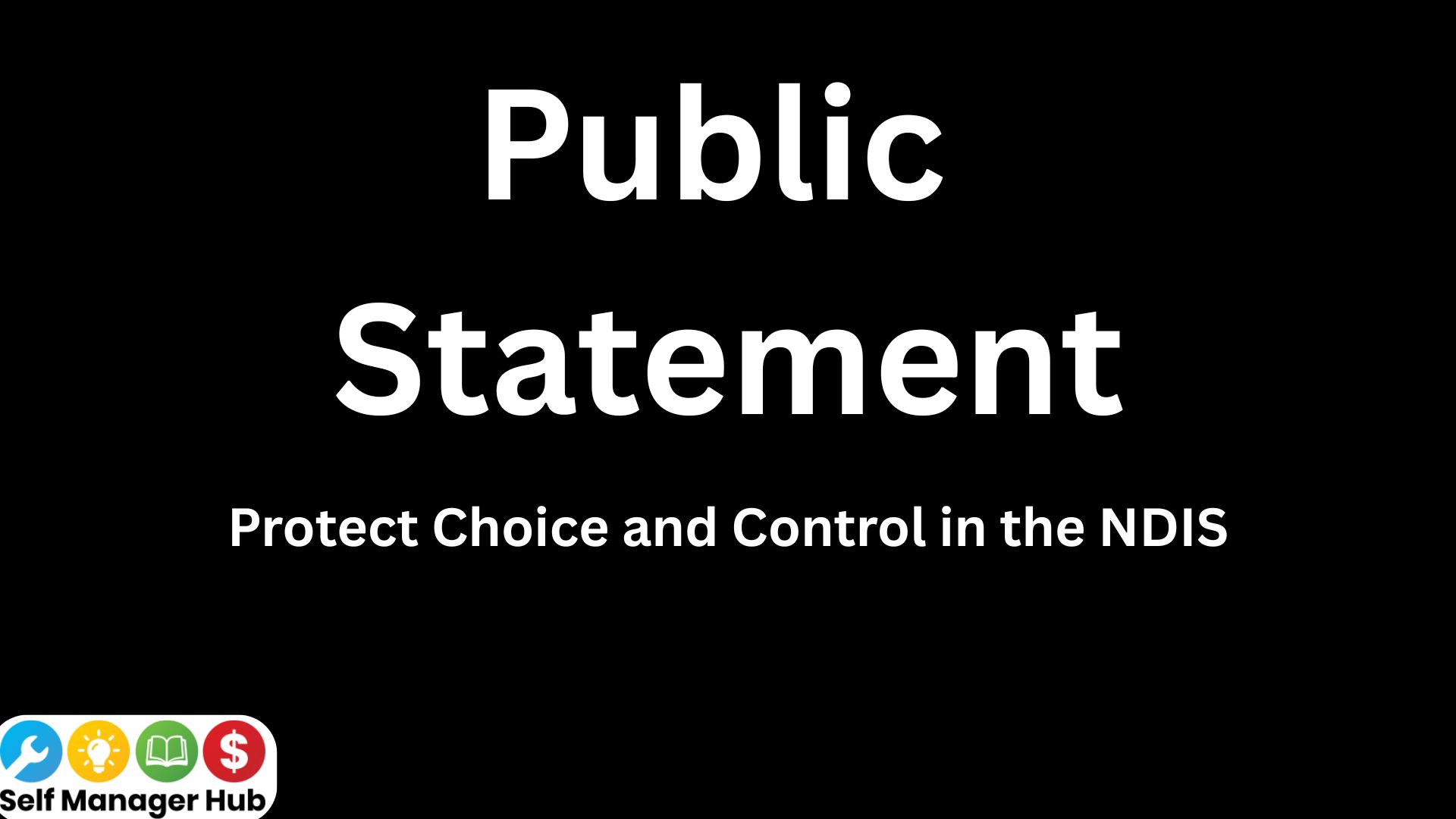Public Statement: Protect Choice and Control in the NDIS | NDIS | NDIS quality safeguard commission | News | NDIS review | registration
| News | Know your rights
| Article
| NDIS | NDIS quality safeguard commission | News | NDIS review | registration
| News | Know your rights
| Article

The Self Manager Hub, Australia’s peer-led organisation for NDIS self directing participants, is deeply concerned about recent changes to the NDIS. These changes are undermining one of the scheme’s most important foundations: the right of participants to have real choice and control over their supports. What was meant to be an empowering, person-centred system is now becoming increasingly rigid, restrictive and out of step with the lives of the people it was designed to support.
From Monday 19 May 2025, participants no longer received their full plan budget at the start. Instead, funds were given out in parts over time. This made it harder to plan and respond to life’s changes, like a sudden illness or loss of informal support. This change was made without proper information, support or input from the people affected.
Self Manager Hub, along with the Disability Representative and Carer Organisations, Independent Advisory Council, Participant Reference Group and others gave extensive advice to the NDIA that funding periods should be set to 12 months as default, and that shorter funding periods should only be applied with the express consent of participants. Instead, the NDIA imposed 3 month funding periods as default, with 1 month funding periods for home and living supports. This decision puts participants with complex or episodic disability at high risk of harm. Participants will not be able to source Functional Capacity Assessment reports as needed, and may not be able to claim the cost of assistive technology, Short Term Accommodation or other higher cost supports when needed.
Loss of flexibility: If a participant needs more support due to unexpected events such as the unavailability of informal supports, they may not be able to access enough funding during that period. This is the case even if their total plan budget allows it. Life can be unpredictable at times and it’s important that our NDIS budgets reflect that.
Risk of service disruption: Claims that exceed the available budget for the current period may be rejected in full. This could delay or interrupt essential supports.
Increased administrative burden: Participants, particularly those who self manage, will face more complexity. This includes splitting invoices when supports span multiple funding periods.
Reduced choice and control: This shift limits participants’ ability to respond to life circumstances. Many view it as a step away from the original vision of the NDIS, a scheme based on trust, autonomy, and flexibility.
Another major concern is the lack of accessible, timely information provided to participants. Many participants are unaware that these changes are coming. Those who do know are struggling to find clear guidance about how the new funding periods will work in practice.
This is not the only problem.
A new law, Section 10 of the NDIS Act, introduced restrictive “In and Out Lists” which decide what supports can and cannot be funded. As a result, people are now being told they cannot access items and supports that are essential to managing their disability and living their day-to-day lives. People are losing supports they rely on, and these lists are causing confusion, distress and serious consequences.
There has also been a rise in “stated supports,” which are fixed line items in plans that cannot be moved between categories. This removes the flexibility people need to adjust their supports as their needs change. It reduces autonomy and the effectiveness of our NDIS plans.
Together, these changes add up to a serious erosion of rights. They take away the ability of people with disability to direct our own lives and to decide how best to use our NDIS funding.
We call on the NDIA and the Australian Government to:
- Reaffirm choice and control as the foundation of all NDIS policies and operations
- Reform policies that reduce flexibility, including funding periods, restrictive support lists and the overuse of stated supports to restore choice and control
- Work in genuine co-design with people with disability, families and peer-led organisations before making changes that impact people’s lives
We demand a return to a rights-based, person-centred approach. We are the experts in our own lives, and we must be trusted to decide what we need and how we use our supports. It is time to respect our lived experience and restore the NDIS to its original vision that empowers us to take control of our lives and live the lives we choose.
You can raise your concerns about the NDIS changes with decision makers by contacting your state and federal MPs.
Find the federal MP for your electorate here.
Find your state member of the Disability Reform Council here.
